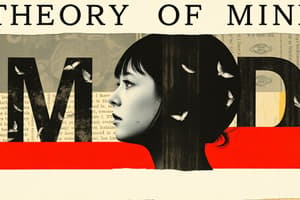Podcast
Questions and Answers
Who first introduced the concept of Theory of Mind (ToM)?
Who first introduced the concept of Theory of Mind (ToM)?
- Isaac Newton
- Simon Baron-Cohen and Alan Frith (correct)
- Marie Curie
- Albert Einstein
Flashcards are hidden until you start studying
Study Notes
Understanding the Concept of Theory of Mind
Imagine trying to read a friend's thoughts, predict their actions, and understand their perspectives without them saying a word. This ability, known as Theory of Mind (ToM), is a fundamental aspect of human social cognition. ToM is the mental process that helps us comprehend and anticipate others' intentions, desires, and beliefs.
The Origins of Theory of Mind
The concept of ToM was first introduced by British psychologists Simon Baron-Cohen and Alan Frith in the 1980s. They observed that people with autism spectrum disorders (ASD) had difficulty understanding the perspectives of others, leading Baron-Cohen to propose that ASD might result from impairments in ToM.
The Components of Theory of Mind
The theory of mind consists of three main components:
- Mental States: This component involves recognizing that others have their own unique beliefs, desires, intentions, and emotions.
- Mental Attribution: This component refers to our ability to assign mental states to others based on their verbal and non-verbal cues.
- Mental State Reasoning: This component involves using our knowledge of mental states to predict and understand others' behavior.
These components work together to allow us to comprehend others' perspectives and form deep, empathetic connections.
The Development of Theory of Mind
During childhood, the development of ToM is a gradual process. Children's understanding of mental states improves with age, and they begin to show an increasing ability to predict others' actions and comprehend their perspectives.
- First-Order ToM: In the first year of life, infants can understand simple social cues and follow others' attention. At this stage, they exhibit First-Order ToM, a basic understanding that others have different perspectives.
- Second-Order ToM: Between the ages of 3 and 5, children begin to understand that others can have false beliefs. This ability, known as Second-Order ToM, is a crucial milestone in the development of social cognition.
- Higher-Order ToM: As children grow older, they learn to understand more complex mental states, such as hidden intentions, pretense, and deception. This understanding, known as Higher-Order ToM, is essential for successful social interactions.
The Neuroscience of Theory of Mind
Researchers have identified several brain regions associated with ToM, including the prefrontal cortex, the temporal cortex, and the medial prefrontal cortex. These areas are involved in processing social cues, mental state attribution, and mental state reasoning.
The Importance of Theory of Mind in Everyday Life
ToM is a vital aspect of human social cognition and plays a role in various aspects of our lives, including:
- Communication: ToM helps us understand the intentions behind others' words, allowing us to better engage in meaningful conversations.
- Empathy: ToM allows us to understand and relate to others' emotions, leading to increased empathy and compassion.
- Moral Development: ToM is essential for understanding moral concepts, such as fairness, justice, and empathy, and allows us to make informed moral judgments.
- Relationships: ToM is a cornerstone of healthy relationships, as it allows us to understand our partners' perspectives and communicate effectively.
Challenges in Theory of Mind
While ToM is a fundamental aspect of human social cognition, some individuals face challenges in their ability to understand and process mental states. For example, people with ASD and other developmental disabilities may struggle with ToM, which can lead to difficulties in social interactions and communication.
In conclusion, Theory of Mind is a critical aspect of human social cognition that allows us to comprehend, predict, and understand others' intentions, desires, and beliefs. The development of ToM is a gradual process that begins in infancy and continues throughout childhood. ToM is essential for communication, empathy, moral development, and relationships. However, some individuals may face challenges in their ability to understand and process mental states. Understanding the concept of ToM can help us better appreciate the complexity of human social interactions and the importance of empathy and compassion.
Studying That Suits You
Use AI to generate personalized quizzes and flashcards to suit your learning preferences.




